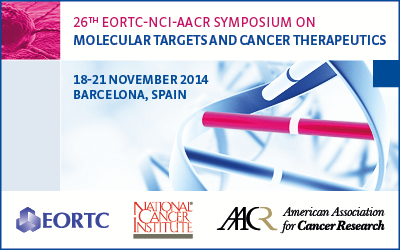
Epic Sciences to Present Data on a Combination CTC and cfDNA Assay for Molecular Targets of Non-Small Cell Lung Cancer Therapies at the 26th EORTC-NCI-AACR Symposium
Print 18 November 2014
SAN DIEGO and BARCELONA, Spain, Nov. 17, 2014 -- Epic Sciences will present data describing the detection of clinically actionable non-small cell lung cancer (NSCLC) biomarkers, including EGFR, KRAS, ALK, MET, RET and ROS1, utilizing both circulating tumor cells (CTC) and circulating free DNA (cfDNA) from a single tube of blood. The poster presentation will take place on November 20 at the 26th EORTC-NCI-AACR Symposium on Molecular Targets and Cancer Therapeutics in Barcelona.
 "Today, tumor biopsies are often tested for alterations to EGFR, KRAS and ALK, but accessing enough biopsy material from lung cancer patients is especially difficult," said Murali Prahalad, Ph.D., president and CEO of Epic Sciences. "The power of Epic's CTC technology is that we can assess, in one assay, clinically actionable NSCLC biomarkers from a single tube of blood and provide in-depth characterization of both CTCs and cfDNA."
"Today, tumor biopsies are often tested for alterations to EGFR, KRAS and ALK, but accessing enough biopsy material from lung cancer patients is especially difficult," said Murali Prahalad, Ph.D., president and CEO of Epic Sciences. "The power of Epic's CTC technology is that we can assess, in one assay, clinically actionable NSCLC biomarkers from a single tube of blood and provide in-depth characterization of both CTCs and cfDNA."Large majorities, roughly 85 to 90 percent, of lung cancers are non-small cell lung cancer. There are three main subtypes of NSCLC. The cells in these subtypes differ in size, shape and chemical make-up when looked at under a microscope.
"Patients with non-small cell lung cancer are matched to a targeted therapy based on an understanding of the genetic and proteomic NSCLC biomarkers, which are recognized as drivers of disease progression," said Ryan Dittamore, vice president, marketing and translational research of Epic Sciences. "With Epic's new combination CTC and cfDNA assay, we have a testing schema which harnesses the power of single CTC analytics and cfDNA with utility for patient selection in clinical trials for new targeted therapeutics from a simple blood sample."
This technology is being examined by top cancer centers across the United States. Moffitt Cancer Center is one of the trial sites.
"This is an exciting era for our patients with NSCLC. The combination of CTC along with cfDNA molecular analyses via a 'liquid biopsy' holds the promise of minimizing the need for the serial, more invasive tumor biopsies while providing information that can affect the decision-making treatment algorithms for our patients in real time," said Jhanelle Gray, M.D., thoracic medical oncologist at Moffitt.
Details of the presentation is as follows:
- Date/Time: Thursday, Nov. 20, 6 p.m. to 7:30 p.m. CET
- Title: Characterization of molecular targets of therapy in non-small cell lung cancer (NSCLC) utilizing a liquid biopsy
- Presenter: R. Dittamore
About Epic Sciences:
Epic Sciences, Inc. is developing novel diagnostics to personalize and advance the treatment and management of cancer. Epic's mission is to enable the rapid and non-invasive detection of genetic and molecular changes in cancer throughout a patient's journey. The company was founded on a powerful platform to identify and characterize rare cells, including circulating tumor cells (CTCs). Our no cell left behindTM technology will help match patients to targeted therapies and monitor for drug resistance, so that the best treatment path can be chosen or modified at every clinical decision point. Today, we partner with leading pharmaceutical companies and major cancer centers around the world. Epic's goal is to commercialize our technology to increase the success rate of cancer drugs in clinical trials and improve patient outcomes by providing physicians real-time information to guide treatment choices.
All Portfolio
MEDIA CENTER
-
The RMI group has completed sertain projects
The RMI Group has exited from the capital of portfolio companies:
Marinus Pharmaceuticals, Inc.,
Syndax Pharmaceuticals, Inc.,
Atea Pharmaceuticals, Inc.

